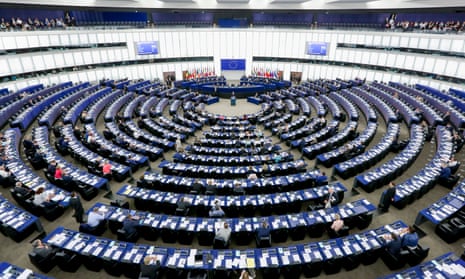It was just another meeting in the European parliament, says Ida Scott*. “There were five people in the room and the speaker turned to me and said, ‘ahh Serena Williams has decided to join us.’” It didn’t matter that the law graduate looks nothing like the grand slam champion. “People laughed, a little bit uncomfortably, but no one said, ‘she looks nothing like Serena Williams and that’s ridiculous.’”
Like most people working in the EU, Scott speaks a few languages and has a policy specialism. Unlike most, she is black. That’s still unusual, even for an organisation that takes pride in the slogan “united in diversity”.
She often finds herself singled out, whether by the Greek neo-fascist MEP “who looks at me with daggers”, the comments on her afro hair “being messy”, or the surprised, over-enthusiastic congratulations offered when someone learns she studied at a top-flight university. “People overlook you, people are insensitive sometimes,” she says. “But if I got upset about all these things it would be so draining.”
The EU institutions are overwhelmingly white – and many predict Brexit will make the problem worse. All 28 European commissioners are white. Nearly all government ministers and leaders are white. Of the European parliament’s 751 MEPs, three are black, compared to the 22 there would be if the institution represented Europe’s black population.
It is impossible to say how many EU politicians and staff come from a black and minority ethnic background, because the statistics do not exist. Moreover, many countries oppose collecting data on ethnicity or race, so no one can say how far the EU under represents non-white Europeans.
But the reality is obvious. In the maze of corridors and meeting rooms of Brussels, people with a minority ethnic background are more likely to be guarding the doors and serving coffee than debating the laws and chairing meetings.
Some believe the lack of diversity will deepen after Brexit. “One of the big concerns is that as soon as you lose the UK, you lose a lot of members engaged with anti-discrimination and Islamophobia,” says Alfiaz Vaiya , who works on anti-racism in the parliament. The UK also has an above-average number of minority ethnic MEPs in frontline jobs.
“It is sad that with us leaving there will be less diversity here,” says Syed Kamall , a British Conservative MEP of Indo-Guyanese origin and the first minority ethnic leader of a European parliament political group. “We are way ahead in the UK. Please don’t take this to say we are perfect, but relatively we are way ahead.”
The London MEP has changed his mind on speaking out about diversity. When he arrived in 2005, “I used to think that just by being here made a difference,” he says. “But now I think I have to say more and let people know that there is a problem.
“[The EU] is not taking ethnic diversity seriously enough at all. People say, ‘well look we have got 28 countries, soon to be 27, that is diverse, what are you talking about?’” He has been taken aback by the attitude of some MEPs to ethnic diversity and recounts a meeting where he contrasted the white politicians with the non-white cleaners. “One of the politicians to my political left, said, ‘well that is just the way it is.’ And I really expected more.”
For anti-racism campaigners, this means the EU has a blind spot on fighting injustice facing people of colour. “Here in the parliament we can find directives about antisemitism, about Islamophobia, about Roma, but not about Afrophobia,” says Cécile Kyenge , the only black female MEP. Kyenge, who experienced extreme racist abuse as Italy’s first black government minister, is drawing up the European parliament’s first resolution to promote equal treatment for the estimated 15 million Europeans of African descent.
While the resolution would be non-binding, it would put structural discrimination on the EU’s agenda. It is also intended to trigger debate on dozens of issues, from the legacy of colonialism to how black Europeans might benefit from EU funds.
But campaigners have detected little enthusiasm from the European commission, the EU’s elite civil service. The commission’s latest diversity strategy had no targets for promoting minority ethnic people, while promising action to support women, disabled people, the LGBTI community and older employees. Shaped by French bureaucratic tradition, the commission does not collect data on race, ethnicity or religion on the grounds of éqalité.
“When you have that ideology, ‘we are colour-blind and we do not talk of race,’ then you have the mentality that is going to lead to misunderstanding at the very best and ignorance at worst,” says Sarah Chander at the European Network Against Racism.
A spokesman for the European commission said: “Collecting quantitative data about the ethnic origin of staff is a very sensitive matter, and opinions as to whether collecting such data is appropriate vary considerably across the EU.
“We aim for a diverse workforce that mirrors the diversity of our society,” he said, listing the commission’s work in universities, careers fairs and efforts to identify “blocking factors and barriers that might affect the selection procedure”.
It still fails to convince Sarah, who works in another EU institution (and prefers not to give her surname). “Whereas they see the problem when it comes to gender, when it comes to race it seems like there are blinkers.”
Will the cause of racial diversity take a step back after Brexit? “My instinct tells me it probably will.”
*This name has been changed
